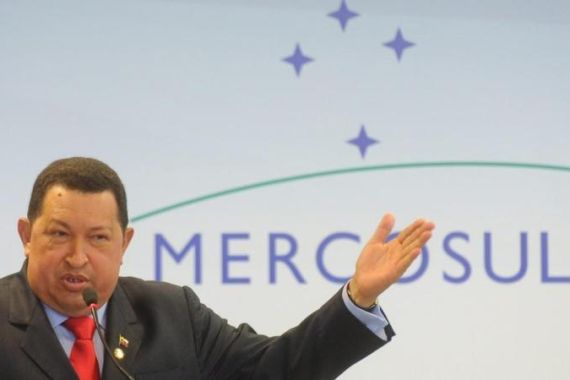Q&A: Venezuela’s former UN Ambassador
Al Jazeera speaks to Milos Alcalay about the state of diplomacy and foreign policy under President Hugo Chavez.

Like many in Venezuela’s intelligencia, Milos Alcalay greeted the 1998 election of Hugo Chavez with exuberance. It was time for a change, Alcalay – a lifelong diplomat who served as Venezuela’s ambassador to the United Nations, Brazil and other countries under several administrations – surmised. In 2004, protesting what he calls “political repression and human rights violations”, Alcalay quit the diplomatic corps.
Former ambassador Milos Alcalay spoke to Al Jazeera’s Chris Arsenault about diplomacy during the Chavez era, south-south cooperation and Venezuela’s opposition in the lead up to presidential elections on October 7.
Chris Arsenault: What was the mood in 1998 when Hugo Chavez won his first election?
Milos Alcalay : I was hopeful. He offered a change, to solve the health and corruption problems. He promised to reduce
military expenditures and to create ways for the poor to access food. I was very enthuastic about the promises. But little by little, that changed. We have had tremendous income in the last 14 years [due to high oil prices] and when you look at the data, corruption and violence are worse. We are seeing the militarisation of power…The dialectic of confrontation has been a hallmark [of the Chavez years].
CA: Serious intellectuals including Tariq Ali at the New Left review and even with plenty of reservations Noam Chomsky have praised the south-south cooperation fostered by Chavez. Don’t you think this is worthwhile?
MA: I believe a lot in south-south cooperation. But you have to have a plan. We started making “south-south” alliances with countries that had no relations with Venezuela in the past… We have adopted an ideological orientation.
In Cuba, Nicaragua [and other countries in the Bolivarian Alliance for the Americas (ALBA)] we are trying to export a model which didn’t work in Venezuela, even with our oil wealth. The model certainly won’t work in countries without oil.
We are exporting diesel fuel to Syria’s [embattled] president Bashar al-Assad and we [supported Muammar] Gaddafi in Libya. We don’t have flights on Venezuelan airlines to Brasilia or Buenos Aires, but we fly to Tehran and Damascus.
CA: How would you describe the day-to-day functions of the diplomatic corps under Chavez?
MA: In the beginning, Chavez would listen to ambassadors and diplomats. Now he does not. They have abandoned career diplomats. It’s a pyramid, with Chavez and his foreign minister on top. Diplomats are afraid to speak out. The only evaluation is the master’s eye, and the diplomatic service has been filled with ideological commissars with no experience.
You can have strong ideological positions in diplomacy. Take Cuba. You can agree or disagree with their actions, but their diplomats are professionals. We have lost the professionalism of diplomacy.
CA: Chavez’s style of governing has been called “petro populism”. How does it affect foreign relations?
MA: Petro Caribe (an oil project) is providing subsidised oil at very low prices to countries in the Caribbean. When you go to Antigua and Barbuda, which receives Venezuelan help, you pay European prices at the gas pump. What happens to these gifts? Do they go into the pocket of the government? Petro Caribe is like Santa Claus that comes to a country.
More than financing, the question is about the model of the Bolivarian Revolution that is being exported. UNASUL (the Union of South American Nations) is now an ideological operation.
CA: But organisations like ALBA are creating real progress. Venezuela produces oil; Bolivia produces soybeans. Why not trade those products directly, based on comparative advantage, rather than each country having to buy US dollars? Isn’t it helpful to trade oil for medical services from Cuban doctors?
MA: Oil should not be traded for beans. Oil should be sold for dollars. Other countries are clear on what they want to sell to Venezuela. Why is PDVSA (the state oil company) bringing doctors from Cuba? Shouldn’t the ministry of health be recruiting doctors?
Every country has to defend its own economic interests.
Chavez receives private enterprise from Brazil with open arms, but Venezuelan private enterprises aren’t invited to the meetings.
China is getting cheap oil [in exchange for loans] but we can only buy Chinese products. Oil is one of those rare products where the master is the one who sells.
CA: I remember when Chavez toured the Middle East and average citizens were greeting him with open arms. Doesn’t that count for something? What other Venezuelan leader has made such a mark on the world stage?
MA: He has made show diplomacy. He goes to the United Nations and says [former US president George W] “Bush is the devil”. It’s easy to sell. Many countries benefit from his largesse. Thank god the US is paying for all this [by buying Venezuelan oil when global prices are high].
CA: How do you think Venezuelan foreign policy will change if opposition candidate Henrique Capriles is elected on October 7?
MA: If Capriles wins we will return to the Inter-American court of human rights. Cuba will hopefully stop receiving 90,000 barrels of [subsidised] oil per day. That will have to be renegotiated.
When I was ambassador to Brazil, our trade balance was equal. Now it’s 90:10 in their favor. There must be reciprocity. There must be professional negotiators. Venezuela entered Mercosur (a regional trade body) through the window after they expelled Paraguay. Chavez called Brazilian technocrats for Mercosur admission rather than relying on Venezuelans.
Our priority relationship with Syria and Iran will end.